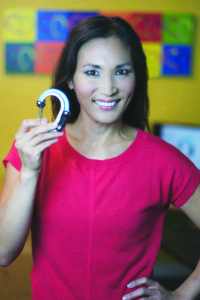4 Female Immigrant Entrepreneurs Making Their Mark in the United States
The Way WoMen Work was initially created as a resource and network for business women and entrepreneurs in emerging economies. But, during a time when the plight and role of immigrants in the U.S. is under assault, it is impossible for us not to make connections between the immigrant women in the diaspora and their sisters in their home countries.
The United States is full of immigrant run businessess. To many Americans, the story of the “hard working immigrant” are most commonly assumed to be men. The reality is, 40% of immigrant entrepreneurs in America are women, according to the National Women’s Business Council (NWBC), and 13% of all female-owned companies are run by women who were born outside of the U.S.
Here are four women originally from emerging economies, who exemplify the female immigrant entrepreneur in the United States.
Valentina Vitols Bello
Caracas, Venezuela – Living in Seattle, WA
Valentina is a professional photographer whose work has taken her around the world. Ten years ago she started her photography studio, Valentina Vitols Studio, and has had her work published in places like The Food Network, Delta Sky Magazine, Jet Airlines Magazine, Interior Design Magazine, Where Magazine,
Valentina also belongs to two investing groups, Pipeline Angels and Alliance of Angels. Before focusing her career fully on photography, Valentina worked as a marketing professional for several technology companies/
Valentina’s passion is to support and mentor early-stage entrepreneurs and women-owned businesses, with a particular interest in sustainability, education, women-friendly products and services, and social and environmental impact. “The companies in my portfolio are a reflection of my belief that it’s truly exciting to be able to make a serious business out of something good.”
Commenting on the experience of immigrant women in business in the United States:
“It’s definitely difficult for women. It’s not an easy path when it comes to fundraising. I’ve had the chance to sit down with many women entrepreneurs — some of them women of color, some of them immigrants — and it’s definitely been really complicated. Not only because they are women. It’s because they’re very questioned on their ability to be able to actually further companies beyond just being a small business. We need to not only band together as women. We also have to bring strategic allies to be part of this conversation.”
Reetu Gupta
India – Living in the Greater Seattle Area
 Reeta began her life in the United States working for AT&T Wireless in 1999, and eventually became the general manager of Honeywell’s commercial displays business where she managed $500M in annual revenue. She also authored several user interface patents in aerospace cockpit technology.
Reeta began her life in the United States working for AT&T Wireless in 1999, and eventually became the general manager of Honeywell’s commercial displays business where she managed $500M in annual revenue. She also authored several user interface patents in aerospace cockpit technology.
While earning her MBA from the University of Washington, Reeta decided to start her own venture, lauching Cirkled in, a college recruitment platform that connects universities with best-fit high school students based on detailed personal portfolios.
In Guptas own words, “Cirkled in helps students shine in the best possible light.” Cirkled has won a number of American Business Awards including the 2017 Grand Stevie Award which recognizes the top 10 companies in the US. In 2016, Gupta received the Gold Stevie Award for Female Entrepreneur of the Year.
Commenting on the experience of immigrant women in business in the United States:
“When it comes to being an entrepreneur, it certainly would have helped a tiny bit if I was not a woman of color from another country. It took me forever to raise half a million dollars. Why? And I have 20 years of experience. I have a master’s in engineering. I have an MBA. I have run marketing and business development. I’ve run a $500 million product line. I can work my tail off. Why? … When you go in front of investors, they see a very different picture. When I walk in a room, they don’t see a hardcore business woman who can make hard decisions on a company and run a successful company and create a unicorn. They don’t see that. There’s a lot of stereotyping. They probably see a mom. They probably see a nanny. They probably see a maid.”
Nourah Yonous
Somolia and Tanzania – Seattle, WA
 Nourah is a Founder and Executive Director at African Women Business Alliance, (AWBA) a “culturally responsive platform that creates and foster community and inclusive economy for African women diaspora and their full potential in business development and entrepreneurship”.
Nourah is a Founder and Executive Director at African Women Business Alliance, (AWBA) a “culturally responsive platform that creates and foster community and inclusive economy for African women diaspora and their full potential in business development and entrepreneurship”.
Nourah also works at Nonprofit Assistance Center- as a Capacity Building Program Manager. She also serves as a board member at SouthEast Effective Development (SEED) and Voices of Tomorrow, a local grassroots organization focusing on early learning systems of change and a Community Leadership Institute Fellow at Puget Sound Sage.C.
As expressed in her bio on AWBA’s wesbite, “Nourah’s own immigrant narrative and trajectory has shaped her life’s mission work, which centers global south/black feminism and deeply connects with Audre Lorde’s work on intersectionality: ”There’s no hierarchy of oppression. There is no such thing as a single-issue struggle because we do not live single-issue lives.” Nourah is also a proud mother to her son, Abdel’Razak.
Commenting on the experience of immigrant women in business in the United States:
“Immediately when I came in this country, my identity shifted. Where I came from, I was known basically by my culture, my identity, my lineage, my language, and all that. And when I came here, I became just a woman of color.When it comes to black diaspora in general and when it comes to black women, we face both racism and sexism … We truly believe in them, in black women, when it comes to businesses. They are the growing population of entrepreneurs, and yet they get only 0.2 percent of venture capital funding and with that only 3 percent goes to women in general.”
Mina Yoo
Korea, Dubai, United Arab Emirates, Jakarta, Indonesia – Seattle, WA
 Mina Yoo is CEO of HEROCLIP, a consumer product company that aims to help people stay organized and keep their hands free. Yoo is originally from Korea and moved to the U.S. in 1991. She earned her Bachelor’s degree from Brown University and later attended the University of Michigan to get a dual Ph.D. in sociology and business administration.
Mina Yoo is CEO of HEROCLIP, a consumer product company that aims to help people stay organized and keep their hands free. Yoo is originally from Korea and moved to the U.S. in 1991. She earned her Bachelor’s degree from Brown University and later attended the University of Michigan to get a dual Ph.D. in sociology and business administration.
When she founded her company, Lulabop, and was looking to launch her first product, Yoo used crowdfunding. She successfully raised enough money to launch the Qlipter – the “Swiss Army knife of cariberners”, and then turned around and successfully raised enough money again to launch Qliplet, now called HEROCLIP. The HEROCLIP is an all-purpose tool that works as a clip as well as a hook to help give you an extra hand. Her success with crowd funding campaigns caught the attention of many tech and business journals.
Commenting on the experience of immigrant women in business in the United States:
“Women entrepreneurs do have this extra hurdle. I was at this trade show a few months ago. I was there for two days, and in two different instances, people who came to our booth told me what a cute little Asian girl I was. And I was like, I have a dual Ph.D. I’m a mom. I have a business. I have two patents. And I just found that to be really abominable.”
The resilience, fortitude, adaptability and ability to look beyond the obstacles in front of them of these four women, exemplifies, what makes female immigrant entrepreneurs one of the United States’ greatest assets.
What’s been your path to success? We’d love to hear your story.
Adapted from: Immigrant perspectives: Women entrepreneurs on ‘microaggressions’ and biases – Starla Sampaco
